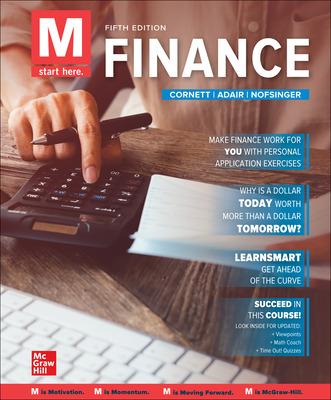Question
Hello, Chegg has the answers listed on the site but I need a better clarification and the work to be shown. The below is the
Hello, Chegg has the answers listed on the site but I need a better clarification and the work to be shown. The below is the narrative with 3 questions that follow. Thanks
Narrative:
You are considering the purchase of a small office building. The office building specializes in offering facilities to small startup firms who are looking to avoid long-term commitments while their businesses are growing. Tenants sign one-year leases and may renew at market rates, if they so desire. The building is configured with 25 suites. Five (5) suites have 4,000 useable square feet and ten (10) have 2,500 usable square feet. The remaining 10 suites each have 1,000 useable square feet. The building has 10,000 square feet of common area. In addition, a food truck pays $6,000 per year to operate in the parking lot during lunch hours. Market rents are $27.50 per square foot, based on total leased space. As there are only a few similar facilities in the market, market rents are expected to increase 3% per year indefinitely. Property taxes are $225,000 per year and increases are capped at 2% per year. Other operating expenses total $250,000 per year and are expected to increase at the rate of inflation, estimated at 3% per year. In most years, capital expenditures equal 4% of effective gross income, although the roof will need to be replaced just before the expected sale at the end of year 5, at an estimated cost of $175,000. You estimate that 5% of the space will be vacant, on average, and that collection losses will total 2% of occupied space. Your market review indicates this property will sell at a price yielding a going-in capitalization rate of 6.5%. You believe the cap rate will increase to 7.5% at the time of a sale. Selling costs are expected to be 5% of the gross sales price. This building is suitable for professional investors, who view capital expenses as a "below the line" item. Based on these parameters, the unleveraged property returns exceed your required returns and you decide to seek mortgage financing. Local lenders are willing to lend up to 70% of the value of the building provided that debt service coverage exceeds 1.5x. Because of the relatively short holding period, lenders are willing to provide interest-only financing at 4.5% with total fees of 1.5%. You expect to close on the purchase on January 1. The land value is estimated at 20% of the purchase price. Because of the start-up nature of the tenants, there is effectively no personal property. Ordinary income is taxed at 30%, while capital gains are taxed at 15%. The depreciation recapture rate is 25%. Your brother will invest with you on a pro rata basis, provided his after-tax returns are projected to exceed 15%.
Questions:
Question #04 Based on the lenders' underwriting requirements, what is the maximum amount, in dollars, they will lend? Answer:
Question #05 Based on this scenario, what are the after-tax sales proceeds, in dollars, available for distribution to the equity? Answer:
Step by Step Solution
There are 3 Steps involved in it
Step: 1

Get Instant Access to Expert-Tailored Solutions
See step-by-step solutions with expert insights and AI powered tools for academic success
Step: 2

Step: 3

Ace Your Homework with AI
Get the answers you need in no time with our AI-driven, step-by-step assistance
Get Started


